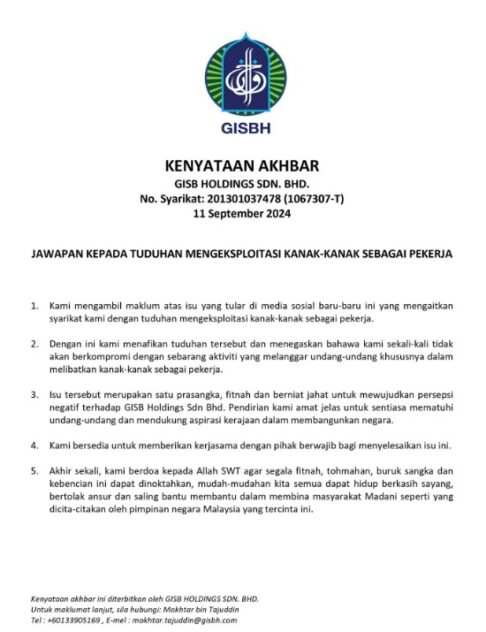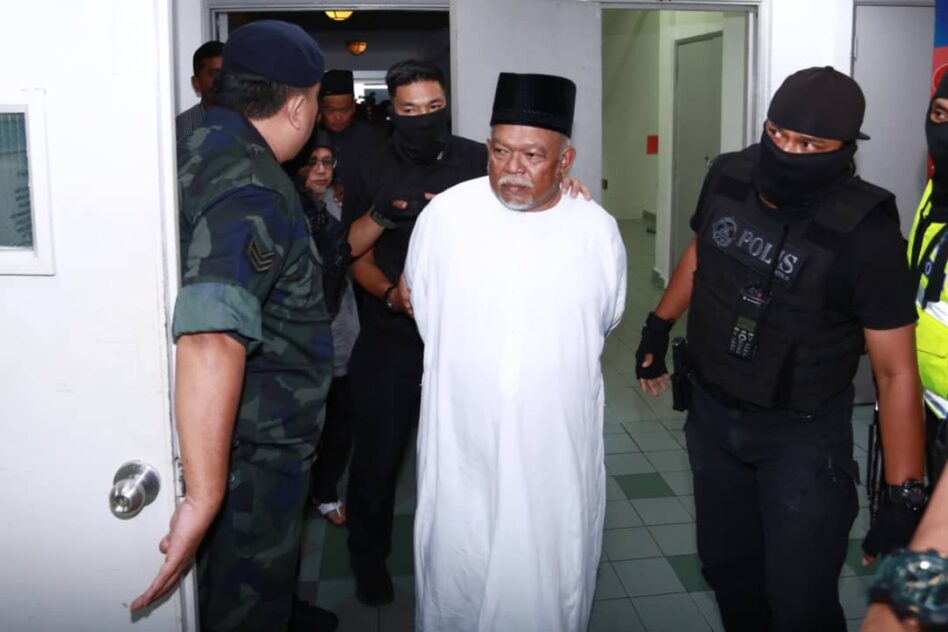ALL of us are in DANGER as anyone can be subjected to an AMLA investigation. If that happens, even before we are CHARGED, let alone found GUILTY by Court, are at RISK of all our Bank Accounts being frozen, our land/property being seized, business affected, etc ... WHAT HAPPENS IF WE THEN NEVER GET CHARGED? Or after trial, we are found NOT Guilty? Would we ever be able to recuperate our losses? Or would we simply remain VICTIMS of a GROSS INJUSTICE with no remedy in sight?
To date, a total of 153 accounts linked to GISB Holdings Sdn Bhd (GISBH) worth RM882,795.94 have been frozen, said Inspector-General of Police Tan Sri Razarudin Husain. He said 38 vehicles, estimated to be worth RM3.94 million, and 14 plots of land, the value of which is still under investigation, were also seized. The freezing of the accounts was carried out under Section 44(1) of the Anti-Money Laundering, Anti-Terrorism Financing and Proceeds of Unlawful Activities Act[AMLA Act}, while the seizures were made under Section 45(2) of the same act. “A total of 26 animals, consisting of nine horses, 14 rabbits, and three peacocks, as well as cash amounting to RM18,650 and two watches valued at RM600, were also confiscated, “ (Sun, 24/9/2024)
In Malaysia, many persons have been arrested and detained for periods - and then NOT EVEN CHARGED in Court? > Government will not provide us for the loss of liberty, possible loss of job, possible destruction of business or income generation activities, sufferings of our families, ...We need a CRIMINAL COMPENSATION law to compensate losses suffered by reason of wrongful arrest, detention, etc caused by government
How many have been Charged and Tried, and then not found GUILTY? How many had to languish in detention because the could not get Bail because law(like SOSMA) said so, or the Court denied our Bail Application, or we simply could not afford to pay the BAIL amount as we were too poor,etc... > > Government will not provide us for the loss of liberty, possible loss of job, possible destruction of business or income generation activities, sufferings of our families, ...we could have lost our cars, houses because we could not pay our month loan payments...We need a CRIMINAL COMPENSATION law to compensate losses suffered by reason of wrongful arrest, detention, etc caused by government
YES - BAD LAWS affect EVERYONE - as we too may fall victim to it someday - SO, LET US do the needful to get rid of Bad LAWS or bad provisions of laws NOW.
REPEAL draconian provisions in the Anti-Money Laundering, Anti-Terrorism Financing And Proceeds Of Unlawful Activities Act 2001(AMLA) - the power to make ADMINISTRATIVE Orders (be it Orders by the ENFORCEMENT Agency, and Orders by the Public Prosecutor) - and this power must be removed, whereby such orders should justly and rightly be COURT Orders, on the application of enforcement agencies or the Public Prosecutor, where the RIGHT TO BE HEARD should be accorded to persons to whom the Order is directed to, and also to anyone affected by such orders.
URGENT - there is no problem as it can urgently be heard as an ex-parte application, whereby the court shall also fix another date to hear the applications inter-parte.
Courts are INDEPENDENT and just, and as such the Courts will judicially evaluate the need for such orders, and even the extend or scope of the orders.
Dangerous for police, enforcement agencies or even prosecution to issue such orders - as they may be biased, or may be a victim of 'tunnel vision' which can result on wrong decisions made that may result in GROSS INJUSTICE.
“tunnel vision” is when a prosecutor(or police/law enforcement) becomes attached to their own interpretation of the right action to take and is unwilling to consider alternatives, even in the face of contradictory evidence and legal norms.
Enforcement officers, and even prosecutors, can be
pressured to make irrational case decisions. Some refuse, no
matter the evidence, to change positions from their initial instincts
or personal sense of right and wrong. Strong political views or prejudices, coupled
with other pressures, have the ability to
influence some prosecutors(and also law enforcement) in a criminal justice system to act
unjustly. While it is sometimes difficult to know their true
motivations for their actions, it seems it is becoming increasingly
normalized for prosecutors and/or law enforcement to be stubborn and arrogant while doggedly
holding to a win-at-all-costs mentality. Do we have a growing “tunnel vision” problem in our country?
This is more so UNJUST as this are ORDERS before conviction, or for orders before CHARGING - whereby appreciating a core principle in the administration of justice being the presumption of innocence, until proven guilty in Court after a fair trial.
In Malaysia, we have provision for the need for Arrest Warrants and Search Warrants - which are orders or warrants issued by Courts - NOT by the police, law enforcement agencies or even the Public Prosecutor.
38 Form of warrant of arrest(Criminal Procedure Code)
(1) Every warrant of arrest issued by a Court under this Code shall be in writing and signed as provided by the Courts of Judicature Act 1964 [Act 91], or the Subordinate Courts Act 1948 [Act 92], and shall bear the seal of the Court.
(2) Every such warrant shall remain in force until it is cancelled by the Court which issued it or until it is executed.
54 When search warrant may be issued
(1) Where-
(a) any Court has reason to believe that a person to whom a summons under section 51 or a requisition under subsection 52(1) has been or might have been addressed will not or would not produce the property or document as required by the requisition;
(b) that property or document is not known to the Court to be in the possession of any person; or
(c) the Court considers that the purposes of justice or of any inquiry, trial or other proceeding under this Code will be served by a general search or inspection,
the Court may issue a search warrant and the person to whom that warrant is directed may search and inspect in accordance with the warrant and the provisions herein contained.
Our administration of justice laws require COURT to issue warrants of ARREST and SEARCH WARRANTS. Even for detention beyond 24 hours for purpose of investigation requires a Court(Magistrates) Order.
In the AMLA Act, strangely these PRE-CONVICTION, worse PRE-CHARGE orders are issued by the Enforcement Agency, and/or prosecution - these unjust provisions must be REPEALED, and the COURT only should have such powers.
THUS, for any PRE-CONVICTION or PRE-CHARGE orders - it MUST be only the COURT that should have the power to issue such ORDERS - like freezing of accounts,seizure of property, closure of businesses, etc
It has been 17 days since the raid and rescue of children homes...Still no CHARGES for AMLA Crimes. How much monies are reasonably suspected to be monies that are related to money laundering, terrorist financing or proceeds of unlawful activities > should not just these be the amounts that ought to be FROZEN or seized?
In making these FREEZING ORDERS, etc, what is the amount of reasonable suspicion/grounds required - 10%,50% or 'beyond reasonable doubt?
44 Freezing of property
(1) Subject to section 50, an enforcement agency may issue an order to freeze any property of any person, or any terrorist property, as the case may be, wherever the property may be, and whether the property is in his possession, under his control or due from any source to him, if-
(a) an investigation with regard to an unlawful activity has commenced against that person; and
(b) either-
(i) the enforcement agency has reasonable grounds to suspect that an offence under subsection 4(1) or a terrorism financing offence has been or is being or is about to be committed by that person; or
(ii) the enforcement agency has reasonable grounds to suspect that the property is the proceeds of an unlawful activity or the instrumentalities of an offence.
(2) An order under subsection (1) may include-
(a) an order to direct that the property, or such part of the property as is specified in the order, is not to be disposed of, or otherwise dealt with, by any person, except in such manner and in such circumstances, if any, as are specified in the order;
(b) an order to authorise any of its officers to take custody and control of the property, or such part of the property as is specified in the order if the enforcement agency is satisfied that the circumstances so require;
(c) where custody and control of the property is taken under paragraph (b), an order to authorise any of its officers to sell any frozen moveable property by a public auction or in such other manner as may be practicable if the enforcement agency is of the opinion that the property is liable to speedy decay or deterioration;
(d) an order to authorise any of its officers to hold the proceeds of the sale, after deducting therefrom the costs and expenses of the maintenance and sale of the property sold under paragraph (c); and
(e) an order as to the manner in which the property should be administered or dealt with.
(3) In making an order under subsection (1), the enforcement agency may give directions to the person named or described in the order relating to the disposal of the property for the purpose of-
(a) determining any dispute as to the ownership of or other interest in the property or any part of it;
(b) its' proper administration during the period of the order;
(c) the payment of the costs of that person to defend criminal proceedings against him.
(4) An order made under subsection (1) may direct that the person named or described in the order shall-
(a) be restrained, whether by himself or by his nominees, relatives, employees or agents, from selling, disposing of, charging, pledging, transferring or otherwise dealing with or dissipating his property;
(b) not remove from or send out of Malaysia any of his money or property; and
(c) not leave or be permitted to leave Malaysia and shall surrender any travel documents to the Director-General of Immigration within one week of the service of the order.
(5) An order made under subsection (1) shall cease to have effect after ninety days from the date of the order, if the person against whom the order was made has not been charged with an offence under this Act or a terrorism financing offence, as the case may be.
(6) An enforcement agency shall not be liable for any damages or cost arising directly or indirectly from the making of an order under this section unless it can be proved that the order under subsection (1) was not made in good faith.
(7) Where an enforcement agency directs that frozen property be administered or dealt with, the person charged with the administration of the property shall not be liable for any loss or damage to the property or for the cost of proceedings taken to establish a claim to the property or to an interest in the property unless the court before which the claim is made finds that the person charged with the administration of the property has been negligent in respect of the administration of the property.
(8) The enforcement agency effecting any order to freeze any property under this section shall send a copy of the order and a list of the frozen property to the Public Prosecutor forthwith.
(9) Where the frozen property is in the possession, custody or control of a financial institution, the enforcement agency shall notify the relevant regulatory or supervisory authority (if any), as the case may be, of such order.
(10) Any person who fails to comply with an order of the enforcement agency issued under subsection (1) commits an offence and shall on conviction be liable to a fine not exceeding five times the sum or value of the frozen property at the time the property was frozen or five million ringgit, whichever is the higher, or to imprisonment for a term not exceeding seven years or to both.
44A Variation or revocation of order to freeze property
(1) An order to freeze property issued under section 44 may be varied or revoked by the enforcement agency that issued the order-
(a) where an officer senior in rank to the officer who issued the order is satisfied that such property is not liable to seizure under this Act; or
(b) on the application of the person named or described in the order.
(2) For the purpose of paragraph (1)(a), where an officer senior in rank to the officer who issued the order is satisfied that such property is not liable to seizure under this Act, he may vary the order in accordance with paragraph (4)(a) or revoke the order.
(3) For the purpose of paragraph (1)(b), an application shall be made in writing to the enforcement agency specifying the grounds on which the variation or revocation of the order is sought and, on receipt, shall be dealt with by an officer senior in rank to the officer who issued the order.
(4) On consideration of an application under paragraph (1)(b), the senior officer concerned may-(a) vary the order with regard to-
(i) the duration of the order;
(ii) the payment of debts incurred in good faith and due to a creditor before the making of the order under section 44; or
(iii) the provision of an allocation for reasonable subsistence and other expenses of that person, his family or employees;
(b) revoke such order; or
(c) refuse the application on the ground that there is reasonable suspicion that the property is-
(i) the subject-matter or evidence relating to the commission of an offence under subsection 4(1) or a terrorism financing offence;
(ii) terrorist property;
(iii) the proceeds of an unlawful activity; or
(iv) the instrumentalities of an offence.
(5) Where the senior officer concerned varies or revokes the order under subsection (2) or (4), he shall release the property or any part thereof as may be relevant to the person named or described in the order.
(6) The officer effecting any release of any property under this section shall make a record in writing in respect of such release specifying in the record in detail the circumstances of, and the reason for, such release, and he shall send a copy of such record to the Public Prosecutor forthwith.
(7) The release of any property under this section does not affect the power of the Public Prosecutor under this Act to seize the property subsequently if the Public Prosecutor is satisfied that the property is-
(a) the subject-matter or evidence relating to the commission of an offence under subsection 4(1) or a terrorism financing offence;
(b) terrorist property;
(c) the proceeds of an unlawful activity; or
(d) the instrumentalities of an offence.
48 Investigation powers in relation to a financial institution
(1) Notwithstanding the provisions of any other written law or any rule of law, the Public Prosecutor, if he is satisfied that it is necessary for the purpose of any investigation into an offence under subsection 4(1) or a terrorism financing offence, may authorise in writing an investigating officer to exercise in relation to any financial institution specified in the authorisation all the powers of investigation set out in Part V and in subsection (2)....
50 Seizure of movable property in financial institution
(1) Where the Public Prosecutor is satisfied on information given to him by an investigating officer that any movable property or any accretion to it which is-
(a) the subject-matter or evidence relating to the commission of an offence under subsection 4(1) or a terrorism financing offence;
(b) terrorist property;
(c) the proceeds of an unlawful activity; or
(d) the instrumentalities of an offence,
is in the possession, custody or control of a financial institution, he may, notwithstanding any other written law, by order direct that such movable property or any accretion to it in the financial institution be seized by the investigating officer or by order direct the financial institution not to part with, deal in or otherwise dispose of such movable property or any accretion to it, in whole or in part, until the order is varied or revoked.
(1A) The investigating officer effecting a seizure under this section shall forthwith notify Bank Negara Malaysia, the Securities Commission or the Labuan Financial Services Authority, as the case may be, of any order made under subsection (1).
(2) A financial institution or any agent or employee of a financial institution shall not, on account of complying with an order of the Public Prosecutor under subsection (1), be liable to any prosecution under any law or to any proceedings or claim by any person under any law or under any contract, agreement, or arrangement, or otherwise.
(3) Any person who fails to comply with an order of the Public Prosecutor under subsection (1) commits an offence and shall on conviction be liable to a fine not exceeding five times the amount which was parted with, dealt in or otherwise disposed of in contravention of the Public Prosecutor's order or five million ringgit, whichever is the higher, or to imprisonment for a term not exceeding seven years or to both, and, in the case of a continuing offence, shall in addition be liable to a fine not exceeding five thousand ringgit for each day or part thereof during which the offence continues to be committed.
In the Section which deals with interpretation of words/phrases,
"enforcement agency" includes a body or agency that is for the time being responsible in Malaysia for the enforcement of laws relating to the prevention, detection and investigation of any serious offence;
See also:-
GISBH – Do Not Impose Pre-Conviction ‘Punishment’, Which May Caused Irreversible Damage to Business and Workers, Based on Allegations or Police’s Suspicions Before the Court Makes A Determination Of Guilt (MADPET)
With this case being a high profile one with it being the subject of endless chatter, speculation and conjecture, there is a very real danger that this case is being tried by the court of public opinion.

Secondly, Hector noted that there should be no pre-conviction punishments. By this, the government must ensure that ‘no punishment’ – some with irreparable damages – is imposed, more so on the innocent persons and/or entities. If pre-conviction punishments have already imposed, it must be speedily revoked or varied.
To date, it has been reported that various actions have been taken against numerous business premises the group which is said to be remnant of the banned Islamic deviant sect, Al-Arqam, by means of freezing of bank accounts, seizure of properties/land, vehicles and livestock, to name a few.
Herein, Hector pointed out that while there have been allegations of wrongdoings in relation to child abuse and sexual crimes at children’s homes allegedly run by GISBH and/or its subsidiaries, these are crimes committed by individual persons, not business entities.

Henceforth, the individual perpetrators must be identified, investigated and charged; it is unjust to also act against sources of income and/or companies they own or work in as such actions may have a significant – if not irreversible – impact to one’s livelihood and life.
Thirdly, Hector highlighted the alarming precedent of the enforcement agencies – instead of the courts – issuing orders to seize/freeze assets related to GISBH.
To date, a total of 153 accounts linked to GISBH worth RM882,795.94 have been frozen under Section 44(1) of the Anti-Money Laundering, Anti-Terrorism Financing and Proceeds of Unlawful Activities Act (AMLA) while the seizures of vehicles and properties/land were made under Section 45(2) of the same act.
Additionally, a total of 26 animals, consisting of nine horses, 14 rabbits and three peacocks as well as cash amounting to RM18,650 and two watches valued at RM600 were also confiscated, according to Inspector-General of Police (IGP) Tan Sri Razarudin Husain.
These orders require the enforcement agency to have reasonable grounds to suspect that an offence has been committed OR that the enforcement agency has reasonable grounds to suspect that the said property is derived from proceeds of an unlawful activity or the instrumentalities of an offence.
It is absurd therefore for an enforcement agency itself to issue orders based on whether it has the needed reasonable grounds.

MADPET is of the opinion that it must be the courts that issue such Section 44 AMLA orders after determining the validity of the enforcement agency’s reasonable grounds. If not, such powers can/may be easily abused by the enforcement agency.
Hector further drew comparison with the case of now incarcerated former premier Datuk Seri Najib Razak which also involved Section 44 of AMLA. He wondered if Najib and his family also had their properties seized and bank accounts frozen or their livestock seized as is the case with GISBH.
Fourthly, Hector questioned why has the order yet to be disclosed to the public? Who is it against?
Note that section Section 44A accords the right to the “person named or described in the order” to apply to revoke or vary the Order.
This Order naturally affects a lot of other people including workers other persons and businesses with business links to these business entities.
What is worrisome, according to Hector, is that employees, owners and GISBH-linked subsidiaries may suffer similar irreparable injustices if the allegations are found to be false or baseless at the end of the day.

In this respect, the legal eagle questioned the speedy action of the police. Why the sudden swoop when apparently police reports have been lodged on the matter as far back as 2011.
The fact that the police operation was called “Op Global” also does not augur well as the name relates to an action against GISBH for suspected criminal activities other than child abuse.
Last but not least, Hector also highlighted the highly sensitive nature of when it comes to allegations of “religious deviants”.
To allow for a professional and unbiased investigations against the alleged suspects, MADPET suggested for a separation of investigations to those related to child abuse and those of religious deviancy with the latter to be handled by the relevant religious agencies.
Given the very high-profile nature of the case, it is indeed pertinent that due process be followed to ensure the proper dispensation of justice.
At the moment, as highlighted by MADPET’s statement, much seem to be knee jerk reaction to public outrage.
The seeming lack of due process also sets dangerous precedents for
which there may be far reaching consequences, not just for the parties
involved but for the Malaysian society at large. – Sept 28, 2024, Focus Malaysia

No comments:
Post a Comment